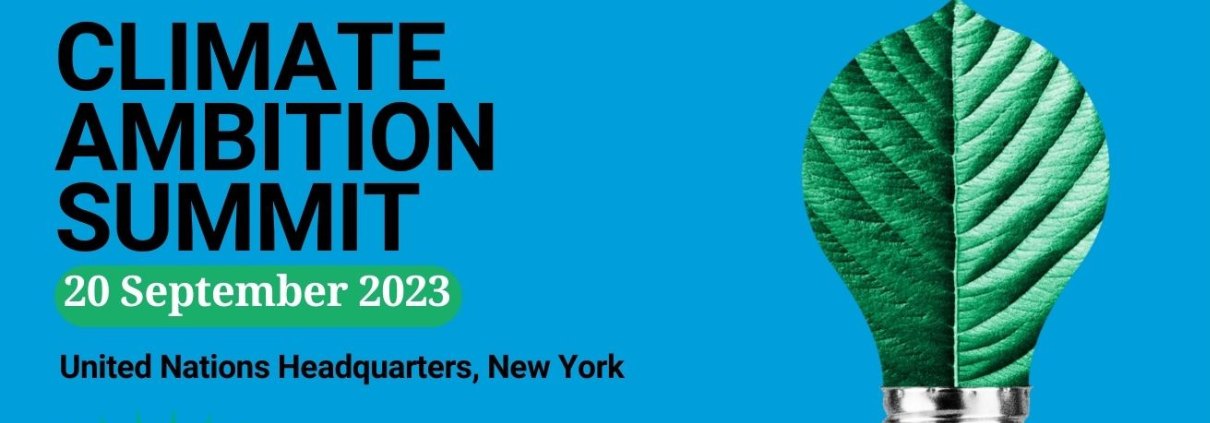The UN Secretary General´s Global Ambition Summit – did it live up to being a “Summit of Hope”?
By: Lena Dente, Senior Programme Manager, Energy and Just Development
On 20 September 2023, the UN Secretary General hosted the Global Ambition Summit, to “showcase ´first mover and doer´ leaders from government, business, finance, local authorities, and civil society” as well as their “credible actions, policies and plans – and not just pledges – to accelerate the decarbonization of the global economy and deliver climate justice”.
COP28 deliberations will officially begin on 30th November and in addition to the UNFCCC Regional Weeks and UN Climate Week, this Summit is a key stop on The Road to COP28.
The Secretary General, António Guterres, came out with a strong statement in particular regarding the future of fossil fuels: “We must make up time lost to foot-dragging, arm-twisting and the naked greed of entrenched interests raking in billions from fossil fuels.” He further framed the urgency of action by stating bluntly, “Humanity has opened the gates of hell.”
Notably, Secretary General Guterres excluded the world’s five largest emitters of greenhouse gases – China, the United States, Russia, India and Japan – from the Climate Ambition Summit.
Bringing Important Stakeholders Together with a Thematic Focus
The Summit was a high-level gathering including leadership from governments, businesses, cities, financial institutions, civil society, and international/regional organisations. Thematically, several important topics were addressed including the credibility of net zero, delivering on climate justice, accelerating decarbonisation, and loss and damages.
Key Outcomes
Several countries present, acted on the technical and economic feasibility of accelerating mitigation efforts and plans. As a result, some countries moved their net zero deadlines forward (e.g., Austria, Iceland, Denmark, Portugal, Nepal), and others committed to implementing more ambitions targets for their current Nationally Determined Contributions.
Addressing fossil fuels was on the agenda for those present at the Summit with a focus on providing clear policy and regulatory clarity, including no new coal and phasing out coal (Romania, Slovakia, Spain – 2025) and Thailand and Vietnam looking to reach that coal by 2040. Colombia, the State of California, Denmark, the Marshall Islands and Tuvalu plan to fully phase out oil and gas while Denmark and Iceland want to ban oil and gas expansion. Canada is looking at ending fossil fuel subsidies. A call was made for adopting the Fossil Fuel Non-Proliferation Treaty with a clear timeline for a global phase out.
The timing is serendipitous to focus on early warning, as current extreme weather events in Libya and Greece highlighted the need for something like the EW4All initiative. The Climate Ambition Summit increased political and financial commitment with new funding announcements to the UN´s US$3.1 billion early warning initiative.
The private sector was also actively engaged at the Summit. For example, the UN-backed Net Zero Asset Owner Alliance (NZAOA) highlighted their requirement that new members, publish science-based intermediate targets within 12 months of joining. The 86 members of the NZAOA oversee USD 11 trillion in assets and represent institutional investors. In addition to highlighting their membership requirements targets, the NZAOA called on governments to remove unnecessary policy barriers to clear the way for an estimated US 275 trillion in clean-energy investments by 2050.
Renewed public support for replenishing the Green Climate Fund to support developing countries in their transitions including loss and damages and universal early warning coverage. The Green Climate Fund met with funding countries in Bonn, Germany on 5th October 2023, where USD 9.3 billion were promised to help poorer nations tackle climate change. This is still unfortunately short of the USD 10 billion target and renewed funds were not committed by some developed countries, including the USA and China.
Critical minerals needed to enable the renewable energy transition were in focus as participants showed support for the UN to create a set of global voluntary principles for transition minerals. For many, this won´t go far enough.
The Last Mile Before COP28
As discussions heat up, across stakeholder groups, the stakes are increasingly higher and the potential conversion points are gaining more visibility. We will help to highlight these issues in our continuing series, The Road to COP28.




